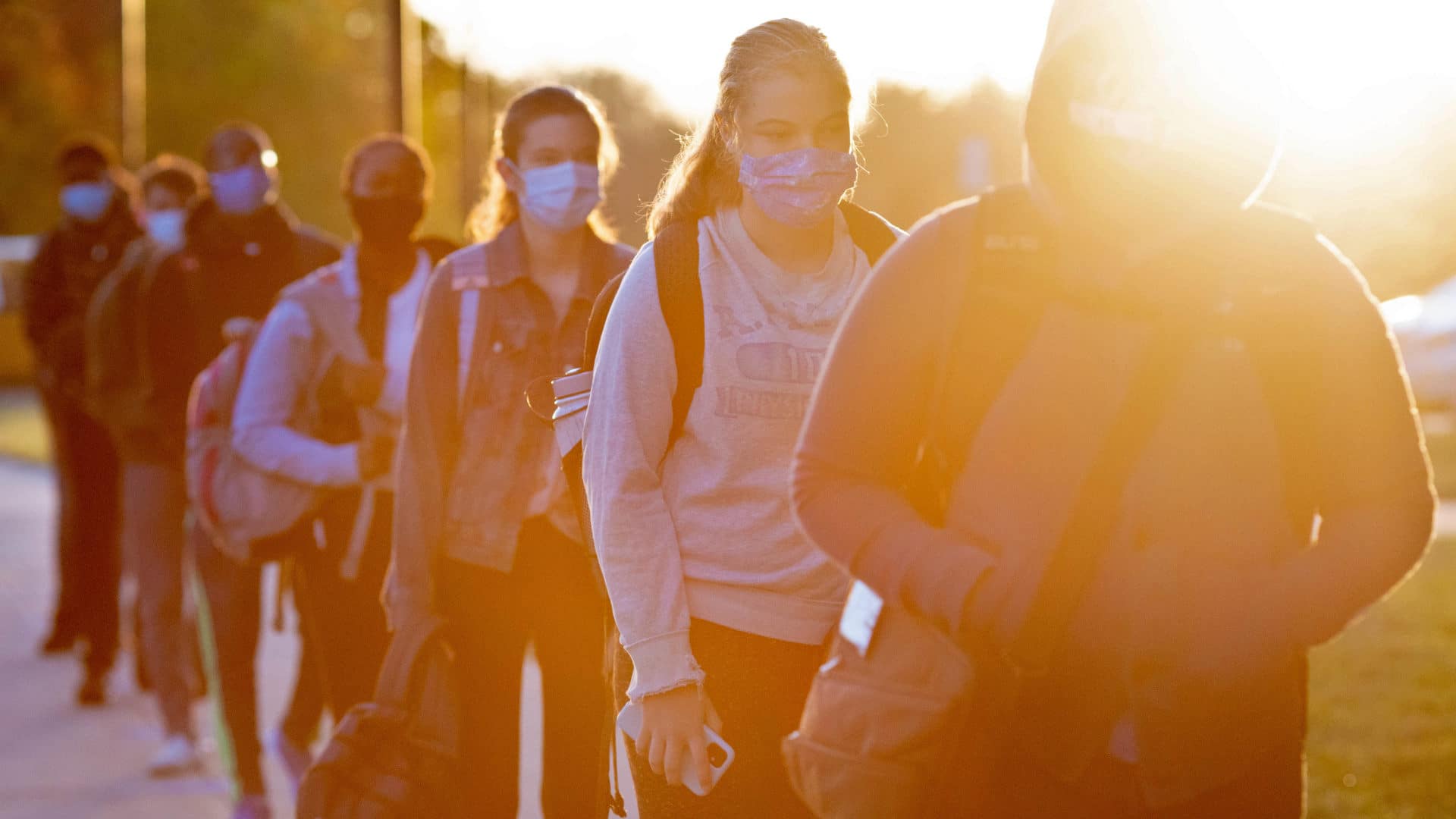On Wednesday, nearly 17 million more people in the United States became eligible for a Covid-19 shot, after the Centers for Disease Control and Prevention formally recommended the Pfizer-BioNTech vaccine for kids aged 12 to 15. The announcement heralds a new phase of the mass vaccination campaign — even as it widens the pandemic gap between the U.S. and many other parts of the world.
Last fall, Pfizer received permission from the Food and Drug Administration to begin testing its shot in early adolescents. According to trial data presented to a CDC-convened expert panel this week, 1,131 kids received the shot and 1,129 a placebo injection.
In the placebo group, 18 kids got Covid-19 during the trial period. Among those receiving the actual shot, the case number was zero. Most of the children receiving the vaccine experienced mild side effects, on par with those reported by adults.
Severe cases of Covid-19 in adolescents are rare, although they do occur. It’s not clear how many will actually get the shots, or whether doing so will bring the U.S. to the elusive goal of herd immunity — a point at which a population has sufficient immunity to a pathogen to largely halt its spread. But experts hope the new wave of vaccinations will further slow the spread of a deadly virus, and ease the contentious process of reopening schools.
The announcement comes amid rising vaccination coverage and dropping Covid-19 cases in the U.S. More than 58 percent of U.S. adults have now received at least once dose of a Covid-19 vaccine. Cases are plunging even in states that had recent outbreaks, and, on Thursday, the CDC ended most masking recommendations for fully vaccinated people.
But while the U.S. is preparing to vaccinate low-risk adolescents, Covid-19 has surged in parts of the world with few Covid-19 vaccines — in particular India, but also Nepal and several countries in southeast Asia. That disparity has upset some physicians, who argue that the U.S. should spend fewer resources vaccinating kids, and more sharing vaccines with high-risk people in hard-hit countries.
For now, the rollout has begun in the U.S., with slots available at pharmacies and plans to ship vaccines directly to pediatricians’ offices. In an interview with The Washington Post, one teenager who participated in the Pfizer trial reflected on the experience of getting the vaccine — or perhaps a placebo. “I just trusted the science,” said Audrey Baker, age 15. “I knew it was tested in adults. I was really just joining, hoping that maybe I could get vaccinated and help out science.”
Also in the News:
• In the summary of a newly released report, an independent panel established by the World Health Organization says it “has found weak links at every point in the chain of preparedness and response” to the Covid-19 pandemic. “The alert system was too slow — and too meek,” the authors write, adding that “the World Health Organization was under-powered” and “global political leadership was absent.” The report culminates a months-long study by the Independent Panel for Pandemic Preparedness and Response, a 13-member group led by former Liberian President Ellen Johnson Sirleaf and former New Zealand Prime Minister Helen Clark. In addition to its scathing assessment of the Covid-19 response, the group proposed policies it says can help the world prepare for the next pandemic threat. These include beefing up WHO’s funding, giving the organization the power to investigate pathogen-handling facilities “with short-notice access,” and limiting the WHO Director-General to a single, seven-year term to ease the position’s political pressures. (The Director-General currently serves a 5-year term, and can run for reelection once.) But some experts are skeptical that the proposals can become policy. In an interview with Science, Georgetown law professor Lawrence Gostin said the report is “an empty vessel because it doesn’t tackle the really hard problems about how you actually implement these plans.” (Science)
• After a multi-year delay by the Trump administration, the U.S. Environmental Protection Agency has released a report cataloging current effects of climate change on the U.S. The report lists 54 indicators — including urban heat waves, thawing permafrost, and damage from coastal flooding — as evidence that changes caused by a human-altered climate are already underway. The EPA also launched a portal that allows Americans to sift through the data in greater detail. According to the agency, the report contains “multiple lines of evidence that climate change is occurring now and here in the U.S., affecting public health and the environment.” The publication is part of the Biden administration’s ongoing attempt to undo Trump-era climate policies. In addition to releasing the report, under EPA Administrator Michael Regan, the agency relaunched its climate change website in March, after those pages had gone dark during the Trump administration. The agency has also moved to undo Trump administration policies that benefitted fossil fuel producers, and to impose new restrictions on the emission of greenhouse gases. (The Washington Post)
• The British government has unveiled a set of animal welfare reform bills, aimed at protecting both endangered species and exploited domestic animals — including a bill that would formally recognize animals as sentient under U.K. law. The set of legislative measures would tighten restrictions on the illegal shark fin and ivory trade, prohibit people to keep primates as pets, require cat-owners to microchip their felines, stop the export of most live animals, and ban the importation of hunting trophies. Lawmakers are also considering banning foie gras; production of the long-controversial delicacy requires force-feeding ducks and geese to enlarge their livers. Also included is legislation aimed at tackling pet theft, which has increased during the coronavirus pandemic, especially the stealing of puppies, as demand for new pets during lockdown grew. “We are a nation of animal lovers,” said George Eustice, the Secretary of State for Environment, Food and Rural Affairs, in a statement. He then evoked the country’s long history of animal legislation, adding that the U.K. was “the first country in the world to pass animal welfare laws.” (The Guardian)
• And finally: The U.S. is scheduled to get its first big offshore windfarm — in 2023. On Tuesday, the Biden administration approved plans for Vineyard Wind, which will include 84 turbines off the coast of Massachusetts. The announcement “is a significant milestone in the more than decade-long effort to permit a commercial-scale offshore wind project in U.S. waters,” according to Reuters. Avangrid Inc. and Copenhagen Infrastructure Partners, the two companies that co-own the Vineyard Wind project, first submitted for federal approval three years ago. Since then, the project’s progress has been delayed by the commercial fishing industry, which says the windfarm may harm fish stocks and vessel traffic, as well as by the Trump administration, which canceled the permitting process in late 2020. Now, the companies may be ready to begin construction later this year and finish, they say, in the second half of 2023. If all goes according to plan, the project should produce around 1 gigawatt of energy, enough to provide electricity to 400,000 homes, and create 3,600 new jobs. The Vineyard Wind approval may be the first of many: Last month, the Biden administration said that it plans to have 30 gigawatts of offshore wind by 2030. (Reuters)
“Also in the News” items are compiled and written by Undark staff. Deborah Blum, Brooke Borel, Lucas Haugen, and Ashley Smart contributed to this roundup.










